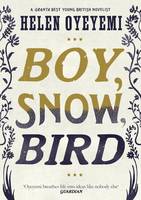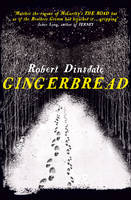Helen Oyeyemi, Boy, Snow, Bird (2014)
 I joined Helen Oyeyemi’s career in the middle, so I know her for White is for Witching (2009), her haunted house story with its cast of merging narrative voices; and Mr Fox (2011?), her tale of a writer and his muse who journey through many iterations of the Bluebeard story. Both are complex works of fantasy, against which Boy, Snow, Bird might seem something of a curveball: it’s a subtler, ostensibly more straightforward piece of work, reminiscent perhaps of Aimee Bender’s fabulations.
I joined Helen Oyeyemi’s career in the middle, so I know her for White is for Witching (2009), her haunted house story with its cast of merging narrative voices; and Mr Fox (2011?), her tale of a writer and his muse who journey through many iterations of the Bluebeard story. Both are complex works of fantasy, against which Boy, Snow, Bird might seem something of a curveball: it’s a subtler, ostensibly more straightforward piece of work, reminiscent perhaps of Aimee Bender’s fabulations.
We begin with a girl named Boy Novak, who escapes from her violent rat-catcher father in 1953 at the age of twenty, moving to the Massachusetts town of Flax Hill. There, she falls in love with a man named Arturo Whitman, who looks after his young daughter Snow, his wife Julia having died. Boy becomes pregnant by Arturo, and gives birth to a girl, Bird; at which point, Boy discovers the truth about the Whitmans: they are a black family who have been passing themselves off as white. Boy sends Snow off to live with her aunt, ‘just for a little while’ – which turns out to be a while longer than that.
Amongst all this are touches of the uncanny (Bird finds that her image does not appear in mirrors, for example) and references to the tale of Snow White. But a story like this could be told without those; so the question arises: what do they enable Oyeyemi to do? Indeed, how does she make them key to the whole book?
What these aspects of the novel do, I think, is affect how we read it. Look at Boy, Snow, Bird through the lens of Snow White, and the beats of the story are off: Boy would be the ‘wicked’ stepmother, but her heart is (at least partly) in the right place when she sends Snow away; Snow would be the banished princess, but she’s the only one of the three title characters whose viewpoint we never experience – and Bird is as much a ‘heroine’ as her sister. The situation is more complex than simple readings of ‘good’ or ‘bad’ will allow. Though the presence of the uncanny underlines that nothing is as it seems, everything is ultimately brought back to reality. Oyeyemi seems to use the trappings of the fantastic to point up that the real world is more complicated – which helps give Boy, Snow, Bird its power.
And here’s another book that puts a fairytale frame around the real world…
Robert Dinsdale, Gingerbread (2014)
 History slides into fairytale and back again in Robert Dinsdale’s latest novel Gingerbread.
History slides into fairytale and back again in Robert Dinsdale’s latest novel Gingerbread.
In Belarus, a young boy’s dying mother takes him to live with his grandfather, her last wish to have her ashes scattered in the forest. His grandfather tells the boy stories: first the myth of Baba Yaga, but then also history twisted into myth – tales of the “great frozen city of Gulag”. As the months pass, boy and grandfather retreat from the outside world and into the forest, marking out a space as their own “gingerbread house” (the mother’s gingerbread being the main tangible reminder that the two have left of her); but, when the boy meets a girl who has moved into his old home, he realises that it may be time to return.
Gingerbread is a wonderfully atmospheric novel, in both Dinsdale’s depiction of the forest landscape, and in the way he translates the “real” and historical into fairytale. The boy and grandfather’s existence in the forest itself takes on a fairytale quality, to the point that there’s quite a perceptual jolt when external forces threaten to bring that existence to a halt.
Dinsdale’s novel is also a thoughtful examination of grief, and our reactions to life’s darkest moments – from individual bereavement to the long-term effects of an experience like being held in the Gulag. Dinsdale explores how we might continue to deal with such events as they fade from living memory into history, and comes to no simple conclusion. Gingerbread is all the more enjoyable for that complexity.
(This review first appeared at We Love This Book.)
Like this:
Like Loading...




 Suzi Feay’s interview with Helen Oyeyemi at the Southbank Centre last night provided a good example of how hearing an author speak about her work can cast new light on a book. After an opening section in which Oyeyemi discussed her love of fairytales as a child, and how she first began writing (crossing out the parts of Little Women that she didn’t like, and writing in her own version—and in a library copy), she read the tale of ‘Mr Fox’ (the English version of Bluebeard), as collected by Joseph Jacobs in the 19th century; followed by the opening pages of her novel Mr Fox, which draws on different versions of the Bluebeard story. Even though I’d already read that book, hearing the author reading aloud from it was almost like encountering it for the first time again.
Suzi Feay’s interview with Helen Oyeyemi at the Southbank Centre last night provided a good example of how hearing an author speak about her work can cast new light on a book. After an opening section in which Oyeyemi discussed her love of fairytales as a child, and how she first began writing (crossing out the parts of Little Women that she didn’t like, and writing in her own version—and in a library copy), she read the tale of ‘Mr Fox’ (the English version of Bluebeard), as collected by Joseph Jacobs in the 19th century; followed by the opening pages of her novel Mr Fox, which draws on different versions of the Bluebeard story. Even though I’d already read that book, hearing the author reading aloud from it was almost like encountering it for the first time again. At first, I was under the impression that Helen Oyeyemi’s fourth book was going to be a short story collection; then I heard it was a novel. Now I’ve read Mr Fox, and it turns out to be a mixture of the two: a novel built around (and largely told through) short stories. We begin in New York of 1938, when the writer St John Fox receives a visit from his (imaginary, yet in a sense perfectly real) muse Mary Foxe, who has come to protest at Fox’s propensity for killing off the women in his fiction. She takes him into a series of stories (some by Mary, others by Foxe), variations on the tale of Bluebeard, in which the two of them play a variety of roles; at the end of this odyssey, Mary hopes, Fox will have changed for the better.
At first, I was under the impression that Helen Oyeyemi’s fourth book was going to be a short story collection; then I heard it was a novel. Now I’ve read Mr Fox, and it turns out to be a mixture of the two: a novel built around (and largely told through) short stories. We begin in New York of 1938, when the writer St John Fox receives a visit from his (imaginary, yet in a sense perfectly real) muse Mary Foxe, who has come to protest at Fox’s propensity for killing off the women in his fiction. She takes him into a series of stories (some by Mary, others by Foxe), variations on the tale of Bluebeard, in which the two of them play a variety of roles; at the end of this odyssey, Mary hopes, Fox will have changed for the better.
Recent Comments